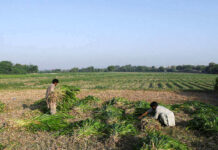Islamabad: The Pakistani government is expressing serious worries about a noticeable decrease in the amount of water flowing into the Chenab River from India. Officials are warning that this reduction could significantly harm the country’s crucial summer crops, known as Kharif crops, which are planted at the beginning and later in the season, reports The New Indian Express.
The Indus River System Authority (IRSA), Pakistan’s water management body, stated that the problem lies with insufficient water being released at the Marala-Ravi Link (MRL) Canal. This canal in Punjab province is a vital source of water for irrigation.
IRSA highlighted that the early part of the Kharif season, which runs from May to June 10th, is especially vulnerable to sudden changes in water availability. They also predict that the later part of the Kharif season, from June 11th to September, will face difficulties if the current low water flow continues.
Following a meeting of the IRSA Advisory Committee (IAC) in Islamabad on Monday, May 5th, Chairman Sahibzada Muhammad Shabir voiced concerns about the sharp decline in water entering the Chenab River at the Marala headworks. He explained that this drop is due to less water coming from upstream India, where the Chenab River originates in Jammu and Kashmir.
“The sudden drop in inflows at Marala is alarming,” the official statement read. “It directly threatens the water needed for early Kharif crops, which are essential for Pakistan’s agricultural production and food security.”
The IAC meeting brought together water experts and representatives from different provinces to assess the current and expected water availability for the ongoing Kharif season. The committee estimated that there could be an overall water shortage ranging from 7% to 21% throughout the season. To lessen the impact, IRSA announced plans to manage the deficit by using the country’s major water storage facilities together.
Despite these efforts, agricultural experts are worried that a prolonged shortage in river water could lead to lower harvests, particularly for crops that require a lot of water, such as cotton, sugarcane, and rice. Farmers in the provinces of Punjab and Sindh, who heavily depend on irrigation from the Chenab and other rivers in the Indus basin, are likely to be most affected by the reduced water supply.
IRSA has urged India to stick to the water-sharing agreements outlined in the Indus Waters Treaty. This treaty governs how the rivers shared between the two nations are allocated and managed. According to the treaty, the Chenab River is primarily designated for Pakistan’s use, although India has limited rights for non-consumptive uses like generating hydroelectric power.
Officials from IRSA have also called on Pakistani authorities to closely monitor the situation and maintain communication with India to ensure transparency and adherence to the treaty’s obligations.
As the Kharif season progresses, IRSA is expected to provide further updates on the water situation and may suggest additional measures to deal with the anticipated water shortage.
















